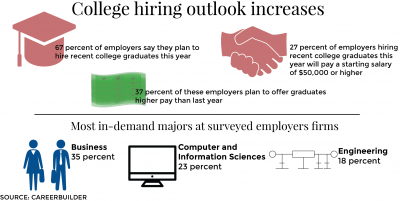
Sixty-seven percent of employers plan to hire recent college graduates this year, according to a Thursday CareerBuilder survey. The hiring outlook experienced a 2 percent increase from last year, though business remains to be the highest in-demand degree among employers.
The survey was conducted online by Harris Poll between Feb. 10 and March 17, with a sample of 2,186 hiring managers and human resources professionals in the United States.
CareerBuilder spokesperson Ladan Nikravan stated that the “steady economic recovery” will benefit this year’s class of graduating students.
“The 2016 college graduates will enjoy the strongest hiring market in 10 years,” Nikravan wrote in an email. “That’s particularly great news for graduates who have business, computer and information science, or engineering degrees. Those professions and others that require math, statistics, clinical health and other high-tech training have well-paying openings.”
In terms of pay, 37 percent of employers plan to offer an increase in starting salaries and 53 percent of employers will not change the starting salary offer, while 11 percent of employers expect a decrease in starting salary, the survey found. Twenty-seven percent of employers expect to offer a starting salary of $50,000 and higher, the survey showed.
Kevin Lang, an economics professor in Boston University’s College of Arts and Sciences, stated that the statistics will continue to trend upward. Jobs for recent college graduates go through cycles, which is similar to other jobs in the economy, albeit less sensitive to the business cycle, Lang added.
“There has been a long-run increase in demand for college graduates which, given continued technological change, seems unlikely to stop any time soon,” Lang wrote in an email. “There will, however, continue to be cyclical variation around that trend so that demand will fall in a recession relative to the trend.”
Though the survey offers a positive outlook for recent college graduates, there are still issues employers are having with recent graduate employees, Nikravan stated.
“Even with this strong outlook, employers continue to report a mismatch in the jobs and the skills of job hunters,” Nikravan wrote.
The survey found that 24 percent of employers report colleges are not preparing students for the work force adequately. Of those employers, 47 percent said colleges put “too much emphasis on book learning instead of real-world learning,” according to the survey. The survey also found that interpersonal and problem-solving skills are lacking among recent college.
BU graduates have a “very good” reputation for getting hired and moving into their careers after earning their degrees, and BU spokesperson Colin Riley said he thinks the reputation will remain intact.
“Study after study shows an investment in a college education has a return on that investment over a lifetime,” Riley said. “It isn’t just in earning, but in job satisfaction and career and life enjoyment and things like that.”
Several students said the recent survey gives them hope that they will find jobs after college, but they worry if professions beside business and computer science will have as much luck.
Tejasvini Jangam, a first-year graduate student in the School of Medicine, said the results are promising for business and computer science majors, but she doesn’t know if all students should be reassured with this statistic.
“I’m in the health profession, and when you think about it … there is still a chance of not getting work.” Jangam said. “I don’t think it’s great, but it is an improvement.”
Sarah Gibson, a sophomore in the College of Communication, said she is interested to see what the individual percentages would be for every major, but the increase of employers interested in college graduates is promising.
“I have a few years before I graduate, but that’s promising, especially if it’s rising,” Gibson said. “Hopefully it will continue to go up.”
Jason Fox, a senior in CAS, said he isn’t surprised business and computer science majors are in such high demand among employers, but he thinks that all college graduates should feel a little better knowing there is a higher likelihood of getting a job right out of college.
“I am graduating this year, but I am enlisted in the army,” Fox said. “That percentage doesn’t necessarily apply to me, but if I wasn’t [in the army], I would be a little more concerned with my employment opportunities, and [the data] would feel promising to me.”


















































































































